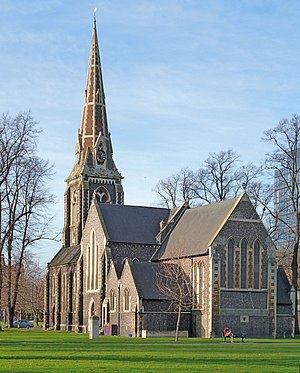Turnham Green
| Turnham Green | |
|---|---|
 Christ Church, Turnham Green |
|
| Turnham Green shown within Greater London | |
| Population | 11,448 (2011 Census. Ward) |
| OS grid reference | TQ212786 |
| London borough | |
| Ceremonial county | Greater London |
| Region | |
| Country | England |
| Sovereign state | United Kingdom |
| Post town | LONDON |
| Postcode district | W4 |
| Dialling code | 020 |
| Police | Metropolitan |
| Fire | London |
| Ambulance | London |
| EU Parliament | London |
| UK Parliament | |
| London Assembly | |
Turnham Green is a public park situated on Chiswick High Road, Chiswick, London. It is separated in two by a small road. Christ Church (architect George Gilbert Scott, built 1843) stands on the eastern half of the green. A war memorial stands on the eastern corner. On the south side is the old Chiswick Town Hall.
The green is the site of local community events, including a travelling funfair, church events and charity table-top sales.
The nearest London Underground station is Chiswick Park on the District line. Confusingly, the eponymous Turnham Green tube station is actually situated on Chiswick Common, some 1 km (0.6 mi) to the east. Turnham Green was the terminus of London Buses route 27 (running from Chalk Farm), but in 2012 the route was extended to Chiswick Business Park; and also the terminus of route 440 (running from Stonebridge Park), but in 2010 the route was extended to Power Road.
Turnham Green was a village on the main road between London and the west. It was recorded as 'Turneham' in 1235 and 'Turnhamgrene' in 1369. On 13 November 1642, the Battle of Turnham Green was fought nearby during the First English Civil War resulting in the Parliamentarians blocking the King's advance on London. In 1680 the homicidal Philip Herbert, 7th Earl of Pembroke murdered a watchman, William Smeeth, after a drunken evening in the local tavern. A similar but far less serious episode in the tavern in 1795 saw the young Daniel O'Connell arrested for drunken and riotous behaviour. The artist William Hogarth had a 'Country cottage' nearby on what is now known as Hogarth Roundabout. As the area developed, it became part of Chiswick.
...
Wikipedia

